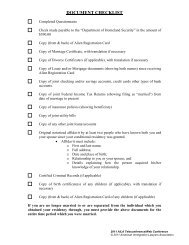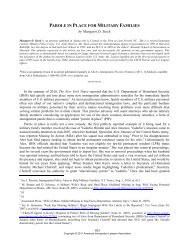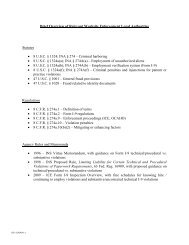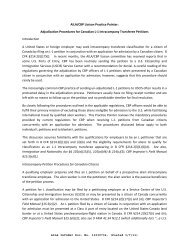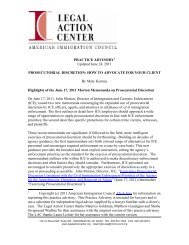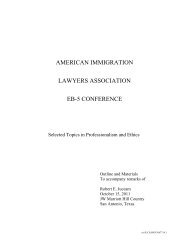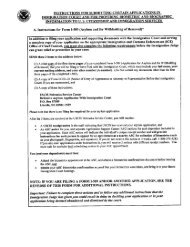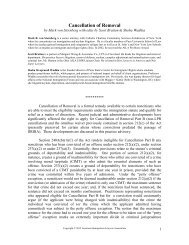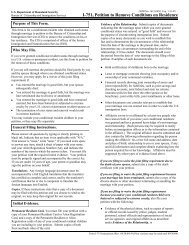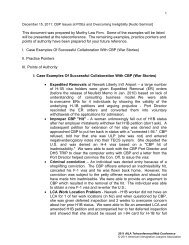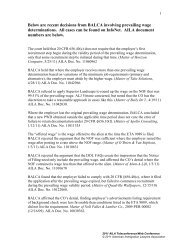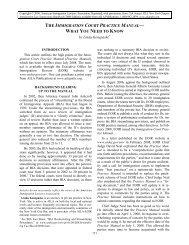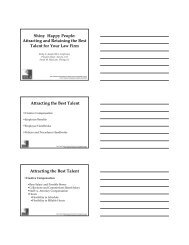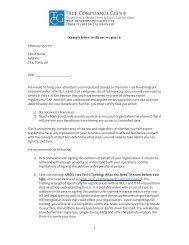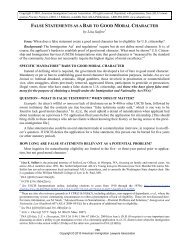Practice Tips on Accessing and Interpreting the ... - AILA webCLE
Practice Tips on Accessing and Interpreting the ... - AILA webCLE
Practice Tips on Accessing and Interpreting the ... - AILA webCLE
You also want an ePaper? Increase the reach of your titles
YUMPU automatically turns print PDFs into web optimized ePapers that Google loves.
Copyright © 2012 American Immigrati<strong>on</strong> Lawyers Associati<strong>on</strong><br />
<str<strong>on</strong>g>Practice</str<strong>on</strong>g> <str<strong>on</strong>g>Tips</str<strong>on</strong>g> <strong>on</strong> <strong>Accessing</strong> <strong>and</strong> <strong>Interpreting</strong> <strong>the</strong> EDGE Database<br />
by R<strong>on</strong> Wada, Christina LaBrie, <strong>and</strong> Jenifer Brown<br />
R<strong>on</strong> Wada is senior counsel at Tafapolsky & Smith LLP. He is <strong>the</strong> author of <strong>the</strong> best-selling book, <strong>AILA</strong>'s Focus <strong>on</strong> EB2 <strong>and</strong> EB3 Degree<br />
Equivalency. He is a co-editor of Mat<strong>the</strong>w Bender’s Immigrati<strong>on</strong> Law <strong>and</strong> Procedure treatise <strong>and</strong> a member of <strong>the</strong> editorial board of Bender’s<br />
Immigrati<strong>on</strong> Bulletin. R<strong>on</strong> received <strong>the</strong> Edith Lowenstein Award in 2011, <strong>and</strong> is a past recipient of <strong>the</strong> Edward L. Dubroff Award for Outst<strong>and</strong>ing<br />
Scholarship in <strong>the</strong> field of Immigrati<strong>on</strong> Law.<br />
Jenifer Brown is a partner with Ice Miller LLP in Indianapolis, Indiana <strong>and</strong> chairs <strong>the</strong> firm's immigrati<strong>on</strong> practice. Ms. Brown practices exclusively<br />
in <strong>the</strong> area of immigrati<strong>on</strong> law. She is former Chair of <strong>the</strong> Indiana Chapter <strong>and</strong> has served <strong>on</strong> <strong>the</strong> Nebraska Service Center Liais<strong>on</strong> Committee,<br />
Distance Learning Committee <strong>and</strong> Social Security Administrati<strong>on</strong> Liais<strong>on</strong> Committee.<br />
Christina LaBrie is of counsel in <strong>the</strong> New York office of Fragomen, Del Rey, Bernsen & Loewy. As part of <strong>the</strong> firm's Professi<strong>on</strong>al <str<strong>on</strong>g>Practice</str<strong>on</strong>g>s group,<br />
Ms. LaBrie assists attorneys with complex or problematic matters, m<strong>on</strong>itors adjudicati<strong>on</strong> trends, drafts c<strong>on</strong>tent for external <strong>and</strong> internal distributi<strong>on</strong><br />
<strong>and</strong> develops internal best practices. Prior to joining Fragomen, she practiced immigrati<strong>on</strong> law in New York for several years, h<strong>and</strong>ling a wide range<br />
of matters from removal proceedings to large corporate accounts.<br />
Opti<strong>on</strong>s for <strong>Accessing</strong> <strong>the</strong> EDGE Database<br />
**********<br />
<br />
<br />
<br />
Subscribe directly to EDGE – current annual subscripti<strong>on</strong> rate for law firms is $1,000 for 5 users + $100 for each<br />
additi<strong>on</strong>al user. See http://edge.aacrao.org/info.php; <strong>and</strong> http://edge.aacrao.org/aacrao-edge-loginpage.php?uri=/<br />
Ask your credential evaluator to report what EDGE says about <strong>the</strong> beneficiary’s degree(s) as part of <strong>the</strong><br />
evaluati<strong>on</strong>.<br />
Request a credential evaluati<strong>on</strong> from AACRAO (allow for slow turnaround, e.g., 3 to 6 weeks is<br />
typical). NOTE: In some cases AACRAO may require detailed informati<strong>on</strong> <strong>on</strong> sec<strong>on</strong>dary school<br />
attendance including diplomas <strong>and</strong> transcripts which may be difficult to obtain. See<br />
http://ies.aacrao.org/<br />
<str<strong>on</strong>g>Tips</str<strong>on</strong>g> for <strong>Interpreting</strong> <strong>the</strong> C<strong>on</strong>tent of EDGE<br />
<br />
<br />
<br />
If you have access to <strong>the</strong> EDGE database, read <strong>the</strong> Overview secti<strong>on</strong> for <strong>the</strong> relevant country. It provides<br />
a general descripti<strong>on</strong> of <strong>the</strong> educati<strong>on</strong>al system <strong>and</strong> can be helpful in developing an underst<strong>and</strong>ing of <strong>the</strong><br />
specific degrees listed. When looking at a specific credential, keep an eye out for “Credential Author’s<br />
Notes,” which may provide additi<strong>on</strong>al clarificati<strong>on</strong> or informati<strong>on</strong>. Also, EDGE may have sample<br />
documents, useful for comparis<strong>on</strong> to make sure you are selecting <strong>the</strong> correct credential.<br />
If you work through a commercial credential evaluati<strong>on</strong> service, beware of evaluati<strong>on</strong>s that refer to<br />
EDGE or cite to EDGE, but do not provide precise informati<strong>on</strong> <strong>on</strong> what EDGE says about <strong>the</strong><br />
beneficiary’s degree. Insist <strong>on</strong> seeing exactly what EDGE says about your beneficiary’s degree; if your<br />
evaluator w<strong>on</strong>’t provide that informati<strong>on</strong>, find some<strong>on</strong>e who will.<br />
EDGE may list credentials as equivalent to U.S. degrees OR as equivalent to a number of years of study<br />
in <strong>the</strong> United States at a specific level. EDGE equivalency that lists years of educati<strong>on</strong>, ra<strong>the</strong>r than U.S.<br />
degree equivalency, means that <strong>the</strong> beneficiary’s degree is NOT equivalent to a U.S. degree. The<br />
following are examples of <strong>the</strong> different kinds of equivalencies listed in EDGE:<br />
o Example of credential listed as equivalent to U.S. degree<br />
• Indian Master of Engineering or Master of Technology – “represents attainment of a level<br />
of educati<strong>on</strong> comparable to a master's degree in <strong>the</strong> United States.”<br />
o Example of credential listed as equivalent to years of educati<strong>on</strong> in <strong>the</strong> United States:<br />
• Danish Diplomingeniør (Diploma Engineering) – “represents attainment of a level of<br />
educati<strong>on</strong> comparable to 3.5 years of university in <strong>the</strong> United States.”
Copyright © 2012 American Immigrati<strong>on</strong> Lawyers Associati<strong>on</strong><br />
<br />
<br />
<br />
For any credential that is not a degree but is instead a diploma, a postgraduate diploma, or certificate,<br />
where EDGE states “represents attainment of a level of educati<strong>on</strong> comparable to a bachelor’s degree in<br />
<strong>the</strong> United States,” USCIS will not accept bachelor’s degree equivalency because <strong>the</strong> beneficiary’s<br />
diploma or certificate is not a degree.<br />
o Examples: 3 year bachelor of science degree followed by 1 year postgraduate diploma from<br />
India, or 3 year bachelor of commerce degree followed by certificate of membership in <strong>the</strong><br />
Institute of Certified Accountants of India. Although EDGE may say that <strong>the</strong> PGD or<br />
membership “represents attainment of a level of educati<strong>on</strong> comparable to a bachelor’s degree in<br />
<strong>the</strong> United States,” nei<strong>the</strong>r <strong>the</strong> postgraduate diploma nor <strong>the</strong> ICAI membership are degrees <strong>and</strong><br />
are <strong>the</strong>refore routinely rejected by USCIS as not being a foreign equivalent degree to a U.S.<br />
bachelor’s degree. “A level of educati<strong>on</strong> comparable to a bachelor’s degree” is not <strong>the</strong> same as<br />
“a foreign equivalent degree” as required by regulati<strong>on</strong>.<br />
Careful attenti<strong>on</strong> should be given to combinati<strong>on</strong>s of educati<strong>on</strong> where <strong>the</strong> fields of <strong>the</strong> degrees are<br />
different.<br />
o Example of degrees in different fields: An Indian three-year Bachelor of Science (Biology),<br />
followed by a Master of Business Administrati<strong>on</strong> – EDGE says <strong>the</strong> master’s degree “represents<br />
attainment of a level of educati<strong>on</strong> comparable to a bachelor's degree in <strong>the</strong> United States.” It is<br />
not clear from EDGE whe<strong>the</strong>r <strong>the</strong> bachelor’s equivalency would be in Biology or in Business<br />
Administrati<strong>on</strong> (in this case it is most likely a bachelor’s degree in business administrati<strong>on</strong>).<br />
In ambiguous situati<strong>on</strong>s, requesting an equivalency evaluati<strong>on</strong> from AACRAO may be an effective<br />
way to clarify <strong>the</strong> equivalency.<br />
Challenging EDGE<br />
<br />
<br />
<br />
In general, USCIS views EDGE as being objective <strong>and</strong> “peer reviewed,” <strong>and</strong> <strong>the</strong>refore routinely rejects or ignores<br />
commercially prepared credential evaluati<strong>on</strong>s that c<strong>on</strong>flict with EDGE, even where multiple evaluati<strong>on</strong>s <strong>and</strong><br />
course-by-course evaluati<strong>on</strong>s are submitted. USCIS regards <strong>the</strong> c<strong>on</strong>tent of EDGE as a rebuttable presumpti<strong>on</strong>, so<br />
petiti<strong>on</strong>ers who may disagree with EDGE must rebut its c<strong>on</strong>tents with objective documentati<strong>on</strong>, not just <strong>the</strong><br />
opini<strong>on</strong>s of o<strong>the</strong>r evaluators.<br />
If EDGE does not directly address <strong>the</strong> beneficiary’s degree, <strong>the</strong>n it is most likely that USCIS would apply its<br />
default 4 year rule for bachelor’s degrees, <strong>and</strong> 6 year rule for master’s degrees. For a discussi<strong>on</strong> of <strong>the</strong>se default<br />
rules, see R<strong>on</strong>ald Y. Wada, <strong>AILA</strong>’s Focus <strong>on</strong> EB2 & EB3 Degree Equivalency, American Immigrati<strong>on</strong> Lawyers<br />
Associati<strong>on</strong> (2007). http://aila.stores.yahoo.net/eb2<strong>and</strong>eb3.html.<br />
The situati<strong>on</strong> where a challenge might be successful is where EDGE provides a blanket equivalency for a degree<br />
from a particular country, <strong>and</strong> <strong>the</strong> petiti<strong>on</strong>er provides documentary evidence showing that <strong>the</strong> specific degree<br />
program completed by <strong>the</strong> beneficiary is different from o<strong>the</strong>r similar degree programs in that country <strong>and</strong> is<br />
<strong>the</strong>refore not addressed by EDGE (e.g., EDGE is out of date, or does not include <strong>the</strong> beneficiary’s degree<br />
program). This is rare, but possible.<br />
Recommended Reading<br />
R<strong>on</strong>ald Y. Wada, <strong>AILA</strong>’s Focus <strong>on</strong> EB2 & EB3 Degree Equivalency, American Immigrati<strong>on</strong> Lawyers Associati<strong>on</strong> (2007).<br />
http://aila.stores.yahoo.net/eb2<strong>and</strong>eb3.html. (NOTE: a Supplement that updates <strong>the</strong> original book is scheduled for<br />
publicati<strong>on</strong> by <strong>AILA</strong> in 2012.)<br />
R<strong>on</strong>ald Y. Wada, “THE Nth DEGREE – Issues <strong>and</strong> Case Studies in Degree Equivalency,” a series of articles published in<br />
Bender’s Immigrati<strong>on</strong> Bulletin, 2009-2010, including:<br />
15 Bender’s Immigr.Bull. 1747 (December 15, 2010) (Traps <strong>and</strong> <str<strong>on</strong>g>Tips</str<strong>on</strong>g> for Drafting PERM Applicati<strong>on</strong>s for<br />
Skilled Workers)
Copyright © 2012 American Immigrati<strong>on</strong> Lawyers Associati<strong>on</strong><br />
<br />
<br />
<br />
<br />
<br />
<br />
<br />
15 Bender’s Immigr.Bull. 995 (July 15, 2010) (Testing Your Knowledge of Degree Equivalency Rules <strong>and</strong> Best<br />
<str<strong>on</strong>g>Practice</str<strong>on</strong>g>s)<br />
15 Bender’s Immigr.Bull. 733 (May 15, 2010) (Working with <strong>the</strong> EDGE Database)<br />
15 Bender’s Immigr.Bull. 569 (Apr. 15, 2010) (Strategies for Avoiding Substantial Equivalence Issues under<br />
Globalnet)<br />
15 Bender’s Immigr.Bull. 423 (Mar. 15, 2010) (Drafting Form 9089 Job Requirements for a Typical EB3 “Safe<br />
Harbor” Case)<br />
15 Bender’s Immigr.Bull. 267 (Feb. 15, 2010) (<strong>Interpreting</strong> <strong>the</strong> EDGE Database)<br />
15 Bender’s Immigr. Bull. 75 (Jan. 15, 2010) (The Single Source Degree Rule)<br />
14 Bender’s Immigr. Bull. 1277 (Oct. 15, 2009) (Drafting Form 9089 Job Requirements for EB-2)
Is EB-2 an Opti<strong>on</strong>?<br />
Analyzing Foreign Educati<strong>on</strong>al Credentials<br />
Using <strong>the</strong> EDGE Database<br />
April 19, 2012<br />
Additi<strong>on</strong>al Resources<br />
AACRAO: American Associati<strong>on</strong> of Collegiate Registrars <strong>and</strong><br />
Admissi<strong>on</strong>s Officers<br />
http://www.aacrao.org<br />
AACRAO: Internati<strong>on</strong>al Educati<strong>on</strong>al Services<br />
http://ies.aacrao.org/<br />
AAO Degree Equivalency Decisi<strong>on</strong> Withdrawn [<strong>AILA</strong> Doc<br />
No. 11022830]<br />
http://www.aila.org/c<strong>on</strong>tent/default.aspx?docid=34678<br />
2012 <strong>AILA</strong> Telec<strong>on</strong>ference/Web C<strong>on</strong>ference<br />
© 2012 American Immigrati<strong>on</strong> Lawyers Associati<strong>on</strong>



